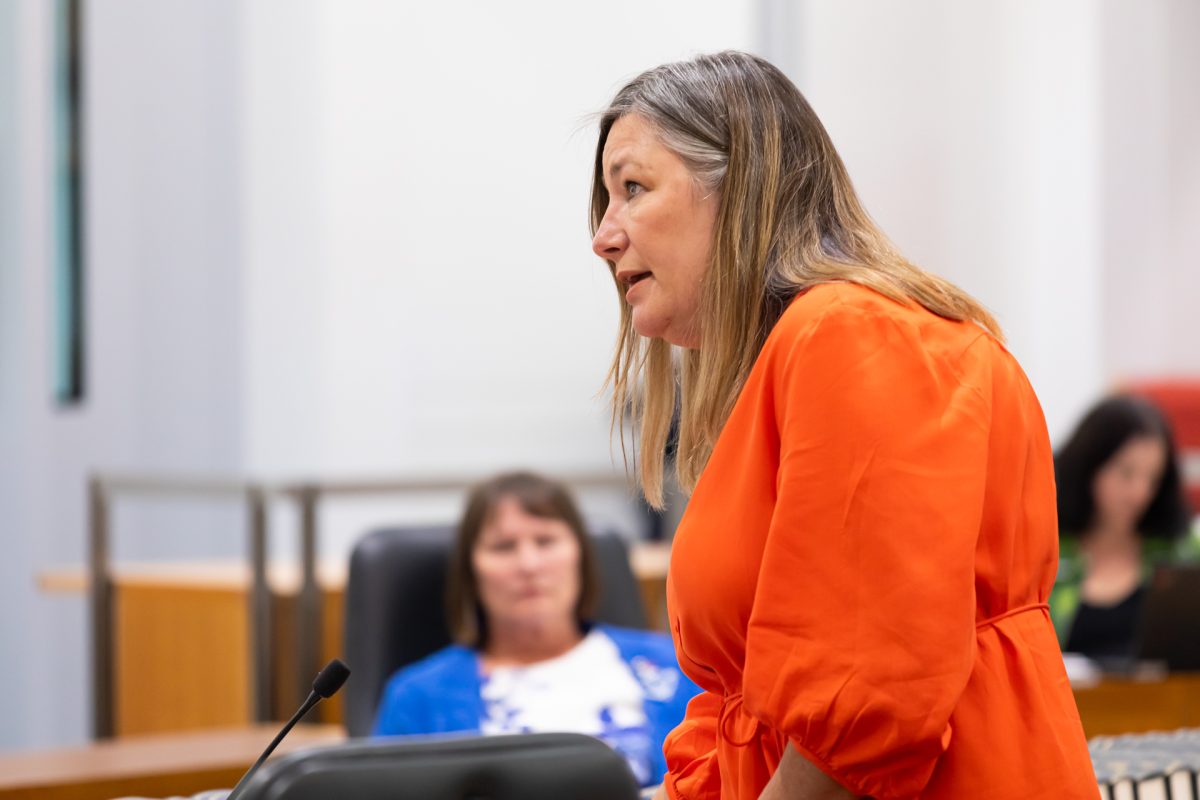
Dr Karen Macpherson says those resisting school changes have deep links to the Education Directorate. Photo: Region.
The academic responsible for the Canberra Liberals’ education policy has called out some of the submissions to the ACT Literacy and Numeracy Inquiry as vested interests opposed to any change to a teaching approach that she claims is failing ACT public schools and students.
Dr Karen Macpherson did her PhD on Concept-based teaching and how cognitive learning theory impacts how children learn. She has taught at university for more than 20 years and initially trained as a primary school teacher.
Dr Macpherson, who says she is not party affiliated and is a strong supporter of public education, said she had made a submission to the inquiry but was concerned to also find a number of submissions from interests with deep links to the ACT Education Directorate, either as consultants or providing professional learning services to teachers.
She said one submission favouring the status quo came from three education academics responsible for training teachers in the “flawed” whole of language, student-centred approach.
“They’re the ones who teach our teachers,” she said.
Her analysis of the submissions showed that of the 71 submissions, nine were neutral, 51 advocated change and 11 were against change.
The overwhelming majority of the non-neutral submissions (82 per cent) that backed schools taking a different approach came from concerned parents, teachers and tutors, education organisations, highly regarded policy think tanks, academics, professional bodies, and Federal Government research.
Dr Macpherson said these pro-change submissions presented compelling evidence in favour of a shift toward evidence-based explicit teaching of basic reading skills, and a stronger, more cohesive education system.
She said those submissions that said the system was working appeared to be linked in some way.
“If we look closely at the authors and their affiliate organisations, a number of them were written by the same group of authors, or their associates, in various combinations,” Dr Macpherson said.
The Foundation for Learning and Literacy, which advocates for a meaning-based, balanced approach to literacy using multiple methods, authored the key anti-change submission, and several of its members have also made individual submissions.
It says the current strategies adopted by the Directorate will bear fruit, urges it to publicise them more and warns against a single, simple teaching method and mandated approaches.
Dr Macpherson said one of its members had been paid $500,000 as a consultant to the Education Directorate since 2018.
The ACT Government Contract Register shows one Foundation member has been awarded four contracts worth $529,080, the latest in 2022.

Education Minister Yvette Berry. Will she implement the inquiry recommendations? Photo: Michelle Kroll.
Dr Macpherson said that despite the overwhelming desire for change, Education Minister Yvette Berry may not adopt the inquiry’s recommendations or only some of them as a face-saving exercise.
She said all parties, including Ms Berry, wanted children to thrive and get a good education, but that did not mean every way children were taught was the right way.
“There was overwhelming evidence that the right way is an explicit, direct, structured, step-wise introduction of learning to read,” Dr Macpherson said.
Dr Macpherson said the ACT system had been underperforming compared with other similar jurisdictions in Australia and internationally for at least 10 years.
“The bottom line is that if the approach of the government was the correct one since the [Future in Education] Strategy was launched in 2018, we should have seen some changes and improvements in results,” Dr Macpherson said.
“We have not seen any; in fact, we have seen an increase in the equity gap in literacy and numeracy, according to the Annual Report, of a whopping 37 per cent in numeracy and 21 per cent for reading.”
She added that many were now realising that the learning ideology that has swept the Western world for 15 years – akin to throwing a child who couldn’t swim into the water and expecting them to work it out – was a flop.
Dr Macpherson said ACT Catholic schools had experienced a turnaround since adopting the Catalyst explicit teaching system, and public schools were losing students as a result.
She said the My School website provided a telling metric about co-located ACT public and Catholic schools with a similar demographic.
“Before Catalyst was introduced, literacy and numeracy results were roughly the same,” Dr Macpherson said.
“Since Catalyst, Catholic schools had improved results where ACT public schools have not.”
She said the ACT’s decentralised, semi-autonomous public system had also contributed to falling standards.
“The result is that we do not have a strong cohesive public education system,” Dr Macpherson said.
“We have a system that is eclectic, where schools decide what sort of teaching approach is going to be used for reading.”
She noted this put an enormous strain on teachers, who deserved more support and needed to be taught how to teach effectively.




















